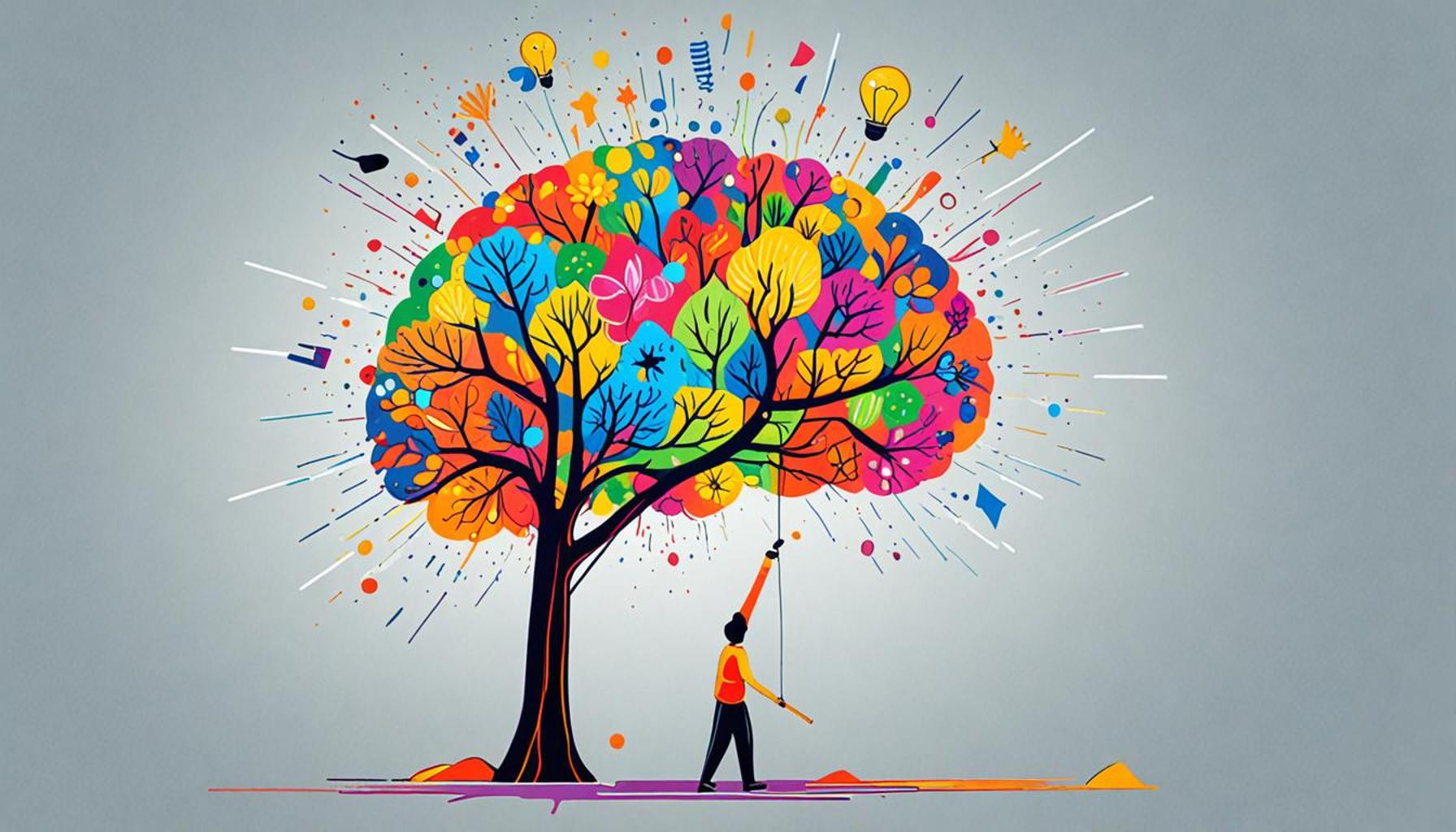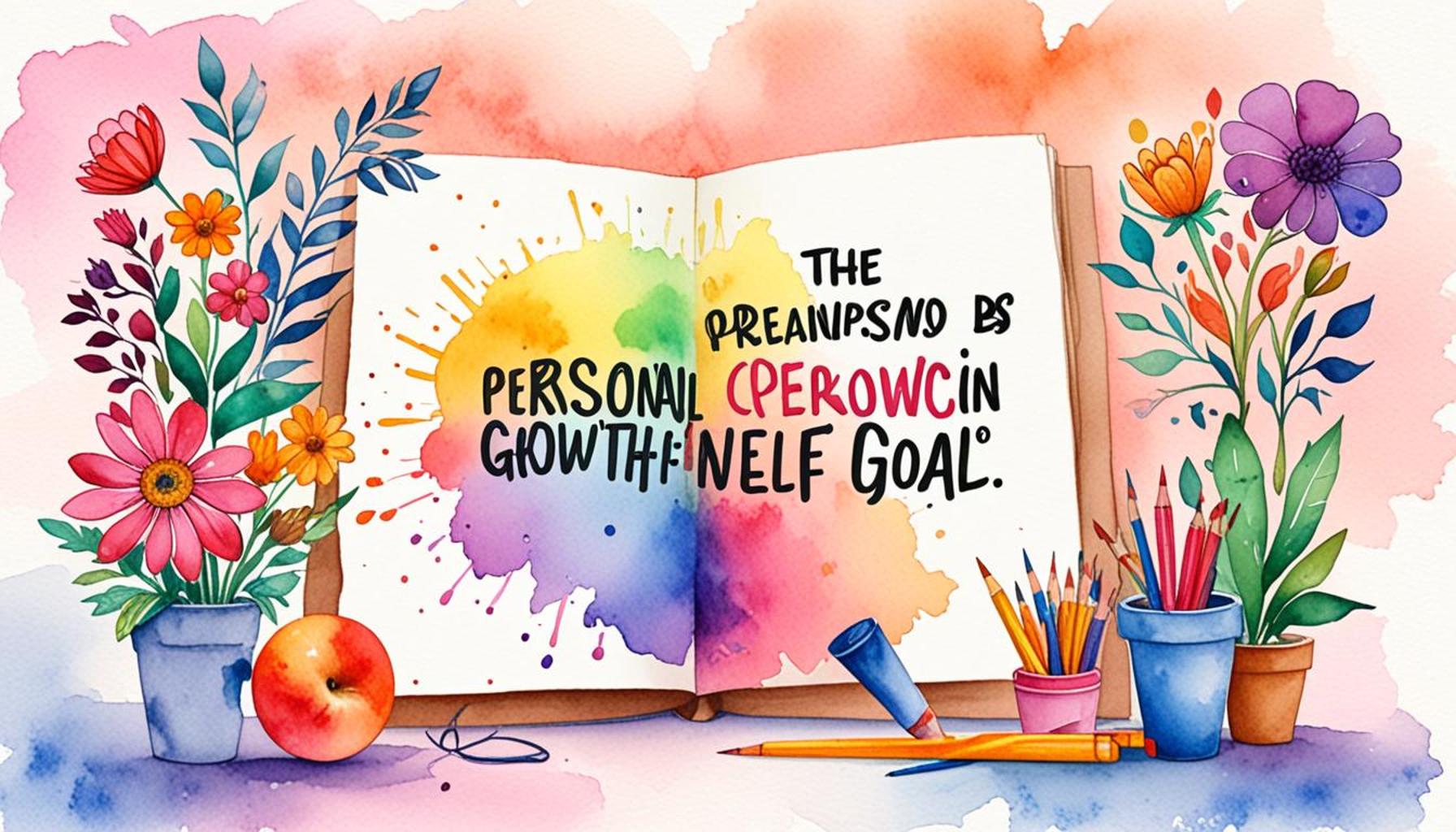The Influence of Growth Mindset on Career Goal Setting: Towards Professional Success

Understanding Growth Mindset in Career Development
In today’s rapidly evolving job market, having a strong foundation in personal development is essential. A growth mindset—the belief that abilities and intelligence can be developed through dedication and hard work—plays a pivotal role in shaping our career paths. This psychological framework not only influences how individuals set their goals but also impacts their overall professional success.
The Key Features of a Growth Mindset
- Resilience: Individuals with a growth mindset view challenges as opportunities for growth. For instance, a young Nigerian entrepreneur who faces obstacles in securing funding may learn from these failures, refining their business model instead of being discouraged.
- Adaptability: They are more open to feedback and willing to embrace change. In a country like Nigeria, where industries such as tech are rapidly evolving, professionals who adapt to new technologies and methodologies often find themselves ahead in their career trajectories.
- Continuous Learning: Such individuals persistently seek out knowledge and skills pertinent to their field. In Nigeria, attending workshops, online courses, or leveraging platforms like Coursera can significantly enhance skills and employability.
In Nigeria, the concept of a growth mindset is particularly relevant as the workforce navigates challenges like economic fluctuations and technological advancements. Embracing this mindset can lead to:
- Enhanced decision-making in career choices: By understanding that their abilities can improve, individuals often make more informed career decisions, leading to greater long-term satisfaction.
- Greater ambition to pursue long-term goals: Those with a growth mindset are not easily dissuaded by setbacks. For instance, many Nigerians pursuing careers in STEM fields continue their education despite challenges, driven by their belief in their potential to succeed.
- Improved performance and productivity in various sectors: An employee who believes in their capacity to grow is more likely to take initiative, propose innovative solutions, and ultimately contribute more meaningfully to their organization.
Recognizing the transformative power of a growth mindset is crucial for professionals aspiring to achieve significant milestones. As we explore the interplay between mindset and goal-setting, it becomes clear how fostering a growth mindset can unravel pathways to success. It emphasizes the importance of viewing failures as stepping stones in one’s career journey rather than as dead ends. Implementing strategies to cultivate this mindset, such as setting specific, actionable goals and celebrating incremental achievements, can fundamentally change one’s career trajectory. In doing so, individuals prepare themselves for a future filled with possibilities, equipping themselves not just to survive but to thrive amid the dynamic changes in today’s workforce.
RECOMMENDED: Check out this similar article
The Power of Goal Setting Through a Growth Mindset
Goal setting is an indispensable component of professional success, particularly in a competitive landscape like Nigeria’s. When individuals embrace a growth mindset, their approach to setting and achieving career goals transforms significantly. Rather than viewing goals as endpoints, they see them as evolving targets that can be modified and refined over time. This shift in perspective not only fosters motivation but also propels individuals toward continuous improvement.

How a Growth Mindset Shapes Career Goals
A growth mindset encourages professionals to think expansively and aspire to reach new heights in their careers. It provides clarity and direction in their goal-setting endeavors. Here are several ways a growth mindset influences career goals:
- Setting Stretch Goals: Professionals with a growth mindset are more inclined to set ambitious yet attainable goals. They understand that pushing beyond their current capabilities can lead to substantial personal and professional growth. For instance, a young graduate in Nigeria may aim not just to secure an entry-level position, but also to target roles that demand advanced skills, envisioning a trajectory that leads them to strategic managerial positions within a few years.
- Establishing SMART Goals: The growth mindset complements the SMART (Specific, Measurable, Achievable, Relevant, Time-bound) criteria for goal setting. It helps individuals develop clear and actionable plans that align with their long-term aspirations. For instance, a teacher in Nigeria desiring to improve their qualifications might set a SMART goal of completing a Master’s program in Education within three years, systematically tracking their progress along the way.
- Emphasizing Continuous Improvement: With a growth mindset, individuals frequently reassess their goals based on feedback and experiences. This flexibility allows them to adjust their plans and steer their career paths more judiciously. An IT professional, for example, may initiate a side project to hone their coding skills while simultaneously seeking mentor feedback to refine their approaches.
Moreover, adopting a growth mindset significantly impacts the manner in which professionals respond to setbacks and challenges. In Nigeria, where the job market can be tumultuous, individuals often encounter hurdles such as fierce competition or economic volatility. Those with a growth mindset are resilient, viewing failures not as destructive end points but as invaluable lessons. This resilience fosters a determination to adapt and rise stronger after each setback, ensuring they remain on track with their career aspirations.
Leveraging Resources for Goal Achievement
In the quest for professional success, individuals can leverage various resources to bolster their growth mindset and facilitate effective goal setting. Networking events, mentorship programs, and educational workshops are vital in providing insights and supportive environments for aspiring professionals. Platforms such as LinkedIn can serve as excellent tools for connection and knowledge-sharing, enabling professionals to surround themselves with like-minded individuals who fuel their development journey.
In summary, understanding the influence of a growth mindset on career goal setting is essential for thriving in any professional landscape. The ability to envision expansive possibilities while remaining grounded in actionable strategies not only enhances career trajectories but also fosters a fulfilling and dynamic professional life. As individuals embrace these principles, they unlock their true potential, transforming obstacles into stepping stones toward success.
The Influence of Growth Mindset on Career Goal Setting
As individuals navigate their professional journeys, the concept of a growth mindset emerges as a pivotal factor in shaping their approach to career goal setting. The psychological framework developed by psychologist Carol Dweck suggests that embracing challenges and persisting in the face of setbacks can significantly influence one’s career trajectory. The growth mindset contrasts sharply with a fixed mindset, where individuals believe their abilities are static and unchangeable. The implications of adopting a growth mindset extend to various aspects of career development, including enhanced resilience, increased motivation, and a heightened desire to improve.When setting career goals, individuals with a growth mindset are more inclined to establish ambitious and progressive objectives. They view obstacles not as deterrents but as valuable opportunities for growth and learning. For instance, an employee faced with constructive criticism may respond more positively, utilizing feedback to refine skills and advance their career. This transformative perspective fosters an environment where continuous personal development becomes a cornerstone of professional success.Moreover, the correlation between a growth mindset and effective goal attainment is increasingly supported by research. Studies show that professionals who cultivate this mindset are more adept at setting specific, measurable, achievable, relevant, and time-bound (SMART) goals. This approach not only clarifies their path to success but also enhances their commitment to achieving these objectives. Consequently, the act of goal setting morphs from a daunting task into an engaging and empowering process, contributing to overall job satisfaction and professional fulfillment.A practical application of incorporating a growth mindset into career goal setting involves the practice of reflective learning. By regularly assessing their progress, individuals can adjust their objectives in response to new insights and circumstances, effectively optimizing their strategies. Furthermore, peer feedback and mentorship can play significant roles in fostering a growth mindset, as collaborative environments encourage shared learning and diverse perspectives.Given the increasing complexity of today’s job market, embedding a growth mindset into career planning becomes not just beneficial but essential. The journey towards professional success is fraught with uncertainties and challenges; however, the growth mindset serves as a guiding principle, equipping individuals with the tools necessary for adaptive goal setting and long-term achievement.
| Advantages of Growth Mindset | Impact on Career Goal Setting |
|---|---|
| Increased Resilience | Overcomes failures, fostering determination to reach goals. |
| Enhanced Learning Opportunities | Encourages setting challenging goals, promoting skill development. |
| Greater Motivation | Inspires continuous pursuit of knowledge and progress. |
| Collaborative Growth | Emphasizes feedback and teamwork, enriching goal-setting processes. |
This dynamic interplay between the growth mindset and career goal setting not only enhances individual potential but also leads to organizational growth and innovation, setting the stage for future success. Embracing this philosophy creates a foundation where career aspirations can be nurtured and actualized.
LEARN MORE: This related article may interest you
Navigating Challenges with a Growth Mindset
The journey toward professional success is seldom linear; within any career path, challenges abound. A growth mindset equips individuals with not only the fortitude to face these challenges but also the strategic insight to navigate them effectively. As job seekers in Nigeria confront a variety of hurdles—from underemployment to economic uncertainties—those with a growth mindset tend to respond with adaptation and creativity.
Transforming Failure into Learning Opportunities
The ability to learn from failures is a cornerstone of a growth mindset. Rather than perceiving setbacks as insurmountable obstacles, professionals view them as opportunities to gather insights that can help refine their goals. For instance, a university graduate who faces rejection during job interviews may analyze their performance and seek constructive feedback. This approach transforms failed attempts into a cycle of growth, fostering resilience and improving their competencies for future applications.
Research indicates that individuals who embrace a growth mindset often exhibit increased levels of perseverance during these challenging times. A notable example can be seen within the Nigerian tech industry, where many startups encourage employees to innovate, even if it means risking failure. Such innovative environments underscore the belief that every failure paves the way for enhanced skills and eventual success.
Resilience and Adaptability in Career Trajectories
Understanding the role of resilience and adaptability is critical in the Nigerian job market. According to a survey conducted by the National Bureau of Statistics, youth unemployment rates in Nigeria have reached alarming levels, emphasizing the need for adaptable career strategies. Professionals with a strong growth mindset are more likely to shift their career goals in response to these realities, exploring various avenues rather than locking themselves into a singular path.
- Embracing Lifelong Learning: Individuals who adopt a growth mindset often emphasize the importance of continuous learning. Enrolling in online courses, attending workshops, or upgrading skills become an integral part of their career plans. For instance, an engineer might pursue learning opportunities in emerging technologies rather than relying solely on their existing expertise.
- Exploring Unconventional Paths: The rigidity of traditional career paths can limit opportunities for those unwilling to pivot. Professionals with a growth mindset may explore freelance work, entrepreneurial endeavors, or diverse industries. A creative individual might transition from graphic design to digital marketing, broadening their career scope while applying their unique skills.
- Cultivating a Supportive Network: Moreover, professionals invest time in building supportive networks composed of mentors, peers, and industry experts. This sense of community creates a valuable feedback loop, allowing individuals to solicit advice and share experiences which refine their career goals and approach. Engaging in local professional associations or participating in social media groups focused on industry topics can be particularly beneficial.
Ultimately, a growth mindset not only influences the manner in which professionals set and refine their career goals but equips them with the resilience and adaptability needed in an ever-changing landscape. By viewing challenges as growth opportunities and tailoring their aspirations accordingly, Nigerian professionals can navigate the complexities of the job market more effectively, setting themselves on a path to sustained success.
SEE ALSO: Click here to read another article
Conclusion: Embracing Growth for Career Advancement
As the competitive landscape of the Nigerian job market continues to evolve, the significance of cultivating a growth mindset becomes increasingly clear. Individuals who incorporate this mindset into their career goal setting are better equipped to not only set ambitious objectives but also to adapt them in the face of challenges and setbacks. This adaptable approach is essential in a climate rife with unpredictability, allowing professionals to see obstacles as stepping stones rather than barriers.
The journey of professional success is inherently a learning curve; those who treat failures as invaluable lessons often emerge more capable and resilient. By engaging in lifelong learning and actively seeking feedback, individuals can enhance their skills and broaden their career horizons. Moreover, as research suggests, the fostering of a supportive network among peers can accelerate personal and professional growth, unlocking new opportunities in various fields.
Furthermore, exploring unconventional career paths can lead to unexpected successes, as individuals leverage their unique creativity and adaptability. In an era where traditional routes to success may not guarantee job security, the ability to pivot and embrace change is more vital than ever. Ultimately, embracing a growth mindset fosters a proactive approach to career development, guiding professionals on a continuous journey toward fulfillment and achievement.
In summary, the impact of a growth mindset on career trajectories highlights its role not just as a tool for goal setting but as a fundamental philosophy that paves the way for sustained professional success. The encouragement of this mindset can empower the workforce in Nigeria, leading to thriving careers founded on resilience, adaptability, and lifelong learning.



